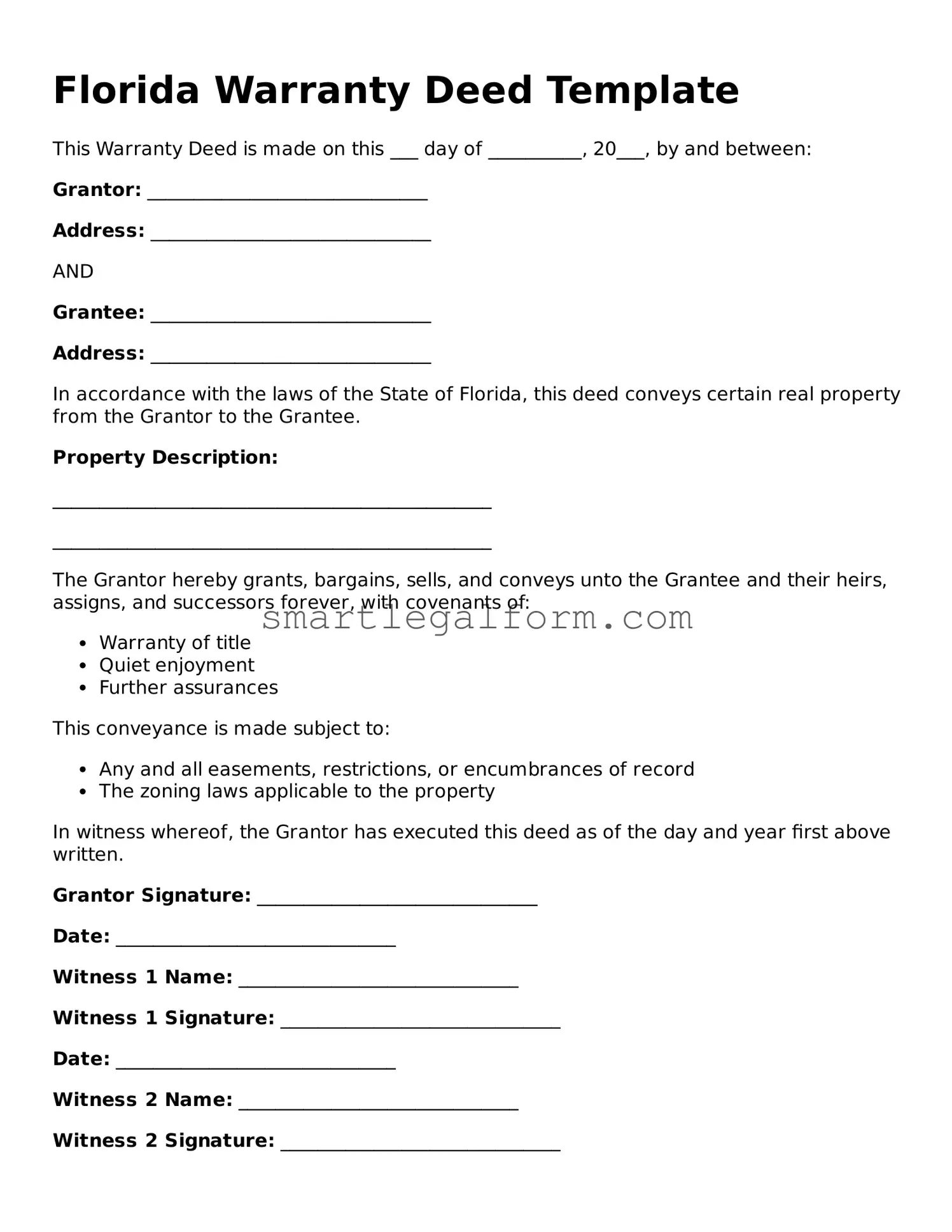Printable Florida Deed Document
Form Preview Example
Florida Warranty Deed Template
This Warranty Deed is made on this ___ day of __________, 20___, by and between:
Grantor: ______________________________
Address: ______________________________
AND
Grantee: ______________________________
Address: ______________________________
In accordance with the laws of the State of Florida, this deed conveys certain real property from the Grantor to the Grantee.
Property Description:
_______________________________________________
_______________________________________________
The Grantor hereby grants, bargains, sells, and conveys unto the Grantee and their heirs, assigns, and successors forever, with covenants of:
- Warranty of title
- Quiet enjoyment
- Further assurances
This conveyance is made subject to:
- Any and all easements, restrictions, or encumbrances of record
- The zoning laws applicable to the property
In witness whereof, the Grantor has executed this deed as of the day and year first above written.
Grantor Signature: ______________________________
Date: ______________________________
Witness 1 Name: ______________________________
Witness 1 Signature: ______________________________
Date: ______________________________
Witness 2 Name: ______________________________
Witness 2 Signature: ______________________________
Date: ______________________________
State of Florida, County of ___________________________
Subscribed and sworn before me this ___ day of __________, 20___.
Notary Public Signature: ______________________________
My Commission Expires: ______________________________
Common mistakes
Filling out a Florida Deed form can be a straightforward process, but several common mistakes can lead to complications. One frequent error is not providing accurate property descriptions. A vague or incomplete description can create confusion about the property being transferred. It's essential to include the complete legal description, which typically can be found in the property’s existing deed or tax records.
Another common mistake is neglecting to include all necessary parties. Both the grantor (the person transferring the property) and the grantee (the person receiving the property) must be clearly identified. Omitting a co-owner or failing to use the correct legal names can invalidate the deed. Always ensure that all parties are correctly named and their roles clearly defined.
People often overlook the importance of signatures. The deed must be signed by the grantor, and in some cases, witnesses may be required. Failing to sign the document or not having the appropriate number of witnesses can result in the deed being considered invalid. It’s crucial to double-check the signature requirements based on the type of deed being used.
Additionally, many individuals forget to have the deed notarized. In Florida, a notary public must witness the signing of the deed for it to be legally binding. Skipping this step can lead to issues when trying to record the deed with the county clerk. Always ensure that the deed is notarized before submission.
Finally, people sometimes fail to record the deed after it has been completed. Recording the deed with the appropriate county office is vital for public notice and to protect ownership rights. Without this step, the transfer may not be recognized, potentially leading to disputes. Make sure to file the deed promptly after it has been signed and notarized.
Dos and Don'ts
When filling out the Florida Deed form, attention to detail is crucial. Here are some important dos and don'ts to keep in mind:
- Do ensure all names are spelled correctly.
- Do provide a complete and accurate legal description of the property.
- Do sign the deed in the presence of a notary public.
- Do include the date of the transaction.
- Don't leave any required fields blank.
- Don't use abbreviations for names or addresses.
- Don't forget to check local requirements for recording the deed.
Following these guidelines can help ensure your deed is valid and properly recorded. Taking the time to do it right now can save you complications later.
Other Deed State Forms
Texas Deed Forms - The names on the Deed should match those on the titles and other legal documents.
The Employment Verification Form is essential for employers when it comes to confirming an individual's employment history, including specific details such as job title, duration of employment, and occasionally salary information. This verification process is vital in the hiring journey, as it allows potential employers to evaluate a candidate's qualifications and dependability. To ensure accuracy and efficiency, it is important for both job seekers and employers to understand how to complete and submit this form, which can be found at documentonline.org/blank-employment-verification-form/.
How to Obtain a Deed to Your House - Correcting a deed after its execution can be complex and requires legal help.
Similar forms
Contract: A contract outlines the agreement between parties and specifies the rights and obligations of each. Like a deed, it requires signatures and can be legally enforced.
Georgia Hold Harmless Agreement: This legal contract plays a crucial role in protecting parties from liability during activities or transactions, ensuring peace of mind. For more details, you can visit TopTemplates.info.
Lease Agreement: A lease agreement is a contract between a landlord and tenant. It grants the tenant the right to use property for a specified time, similar to how a deed transfers ownership rights.
Bill of Sale: A bill of sale documents the transfer of ownership of personal property. It serves a similar purpose to a deed by providing proof of ownership and the terms of the transfer.
Power of Attorney: A power of attorney allows one person to act on behalf of another in legal matters. Like a deed, it requires formal execution and can convey authority or rights.
